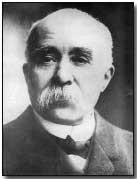Who's Who - Georges Clemenceau
 Georges Clemenceau (1841-1929) was
French prime minister twice, in 1906-09 and from November 1917-20.
Georges Clemenceau (1841-1929) was
French prime minister twice, in 1906-09 and from November 1917-20.
Nicknamed "The Tiger", Clemenceau's staunch republicanism brought him into early conflict with Napoleon III's government. Although trained as a doctor he travelled to the U.S. where he remained for several years as a teacher and journalist, returning to France in 1869.
Following the 1870 overthrow of Napoleon III, Clemenceau became mayor of Montmartre in Paris. A member of the chamber of deputies from 1876 as a Radical Republican, he failed to win re-election in 1893 after being implicated in the Panama Canal scandal, and unjustly accused of being in Britain's pay.
For the following nine years he concentrated on his journalism, penning daily articles for La Justice and founding Le Bloc in 1900.
In 1902 Clemenceau was elected senator, and in 1906 became minister of the interior and then premier. During his first tenure as prime minister he forged closer ties with Britain and settled the Moroccan crisis.
In 1909 Clemenceau's government fell and Aristide Briand succeeded him as prime minister. In the following years Clemenceau vigorously attacked Germany and argued for greater military preparedness in the event of war.
Clemenceau succeeded Paul Painleve as premier in November 1917, having been appointed by President Raymond Poincare, and remained in the post until 1920. Having become prime minister for the second time he formed a coalition cabinet, serving as minister of war himself.
Clemenceau worked to revive French morale in the country at large, and persuaded the Allies to agree to a unified military command under Ferdinand Foch; he energetically pursued the war until its conclusion in November 1918.
At the Paris Peace Conference Clemenceau insisted upon the complete humiliation of Germany, requiring German disarmament and severe reparations; France also won back Alsace-Lorraine. Even so, he remained unsatisfied with the Treaty, often coming into conflict with U.S. President Woodrow Wilson, whom he viewed as too idealistic.
In the presidential elections of January 1920 Clemenceau was defeated, ironically after facing charges that he was too lenient in his treatment of Germany at the Treaty.
Following his retirement from politics Clemenceau wrote his autobiography, In the Evening of my Thought (1929). He predicted a renewed war with Germany by 1940. He died on 24 November 1929 in Paris.
Click here to read Clemenceau's reaction to news of a major Italian defeat at Caporetto in October 1917; click here to read the urgent appeal issued by the Prime Ministers of France, Italy and Britain to President Woodrow Wilson for additional troop supplies in early June 1918; click here to read Clemenceau's opening address at the Paris Peace Conference in January 1919.
A "Bangalore Torpedo" was an explosive tube used to clear a path through a wire entanglement.
- Did you know?
